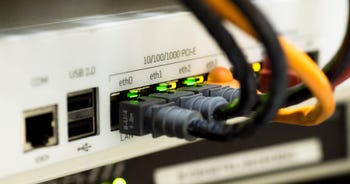How to keep your business internet running in a power outage
Power outages can bring everyday operations to a grinding halt, disrupting communication, productivity, and access to essential online resources. In an increasingly digital world, a reliable internet connection has never been more crucial for keeping your business running.
When the power goes out, not only can your business face the risk of losing productivity, but it can also have a significant impact on your customers.
In this Bionic guide, we’ll walk you through the best ways to keep your internet router running in a blackout and how to prepare for the occasion to keep your business on its feet when the lights go out.

30-second summary
- A power outage is a sudden loss of electricity, normally because of an issue with the main power supply. This can be caused by various factors including bad weather, equipment failure, maintenance or accidents.
- Power outages can disrupt trading, especially if the equipment relies on the internet or electricity. This can cause revenue loss and damage business reputation.
- Drops in power result in downtime, interrupt your internet, damage equipment and cause data loss.
- To keep your router running during an outage try using a backup battery, connect to an external power bank, invest in a backup generator or use a mobile hotspot.
- Cloud-based services like VoIP systems are the best for safeguarding against outages as data is stored remotely, backed up and recoverable.
- Prepare your business for a power outage by creating a contingency plan, communicating with your staff, testing backups and investing in other power systems.
What is a power outage?
A power outage, or blackout, is when an area or building suddenly loses all electrical power, usually because the electricity supply has been disrupted. This results in a complete or partial loss of power.
Power outages can be caused by various factors, including bad weather conditions, equipment failure, scheduled maintenance, or accidents. During a blackout, all electrical devices and systems that rely on the grid lose power and will stop functioning until the electrical supply is restored.
What can a power outage mean for your business?
Without electricity, the systems needed to power a business may completely fail and this can affect trading. Extended power outages can lead to prolonged downtime, where organisations cannot work at full capacity or provide services to customers. This can result in revenue loss, missed opportunities, unhappy customers, and potential damage to your business reputation.
Even if your devices or machinery can continue to work without a mains connection, they may not be able to operate if they require an internet connection. Internet routers must be connected to the mains to access the web, so your business could face the challenge of getting online.
How to keep your internet router running in a blackout
To keep your internet router running during a blackout, here are several methods you can try:
Use a backup battery or a UPS
A backup battery, or an Uninterruptible Power Supply (UPS), can provide temporary power to your router during a power outage. These devices connect to your Wi-Fi router and act as a bridge between the power source and the router, ensuring a reliable power supply for a limited time. They can provide an additional 3-6 hours of usage, but this depends on the battery’s capacity and how many devices are connected.
Available in a range of shapes and sizes, backup batteries will last for varying amounts of time, depending on the device’s size. To reserve the battery, switch your router off when not in use.
Connect to an external power bank
Some routers also support power bank connections – these are convenient stores of energy that share electricity with compatible devices that they are connected to.
Connecting your router to a fully charged power bank allows you to keep it running even when the main power supply is cut off. Make sure to use a power bank with sufficient capacity and compatible output for your router.
Invest in a backup generator
For more extended power outages, consider investing in a backup generator to provide continuous electrical energy to your router. Backup generators are typically much more powerful than backup batteries or external power banks and may be able to run multiple essential devices in your business during an outage.
This makes them a better option for companies who rely heavily on electrical or internet access or if blackouts tend to last a while. They can be a little on the pricier side, but it might be a worthy long-term investment if your business is particularly susceptible to outages.
Mobile hotspot
When power outages keep happening, and a backup power source is not an option, you can rely on a mobile hotspot. Many smartphones can act as Wi-FI hotspots, allowing you to connect your router or other devices to the cellular network for internet access.
Keep in mind that this option may depend on cellular network availability and signal strength in your area.
In addition, hotspots can drain mobile device batteries fairly quickly, and the number of devices you can connect to them is limited.
MiFi hubs are another alternative to mobile hotspots and have their own energy pack, so you don’t have to worry about draining your phone’s battery. Learn more about MiFi here.
How can a power outage affect your business?
There are loads of ways an outage can affect the running of your business. Here are some of the main issues you might have.
Disruption of power supply
The most obvious impact of a power outage is the loss of electricity, which can disrupt the normal functioning of your business. Without power, lighting, and heating or cooling systems, your other electrical equipment may not work, affecting your workflow.
Blackouts can also affect the working conditions of your employees, making them unable to carry out their everyday tasks — they can’t work if the business is plunged into darkness!
Interruption of internet services
Power outages often result in the loss of internet connectivity, as the router cannot function without access to the mains.
Without an internet connection, your business may not be able to access cloud-based services and limited or no access to critical online resources necessary for day-to-day operations.
Online communication channels may also be interrupted, like if you rely on a Voice over Internet Protocol (VoIP) phone system, email, or video conferencing.
Find out more about VoIP systems for businesses with our guide.
Loss of data
Blackouts can lead to data loss if businesses do not have proper backup systems in place. Unsaved work or sudden shutdowns can result in the loss of important files, documents, or transactional data. This can have bad consequences, such as delays or compromised business continuity.
Downtime
Power outages can cause significant downtime, during which your business operations come to a halt. This downtime can result in delayed projects, missed deadlines, decreased productivity, and a potential loss of revenue.
The longer the outage, the worse the impact on your business.
Equipment damage
Power fluctuations, surges, or sudden power restoration can damage electrical equipment. Without proper surge protection or UPS, electronic devices such as computers, servers, routers, and other network equipment could get damaged or completely fail during power outages.
Do you lose the Wi-Fi when the power goes out?
Yes, in most cases, you will lose Wi-Fi connectivity when the power goes out. This is because Wi-Fi is only accessible via a Wi-Fi router or modem, and these typically require a continuous power supply to function. So, when there is no electricity to power the router during a power outage, it will be unable to transmit the Wi-Fi signal.
Even if you have fully charged devices capable of connecting to Wi-Fi, they won't be able to access the internet without the functioning router. The Wi-Fi network will be unavailable until electricity is back on and the router powers up again.
Can I use a router without power?
No, you cannot use an internet router without power.
The power source for a router is usually an electrical outlet, and the router needs electricity to power its internal components, including the processor, memory, and network interfaces. Additionally, the router needs power to transmit the Wi-Fi signal or provide wired internet connectivity to connected devices. Without power, the router cannot access the internet or connect to the local network.
Can cloud-based services help my business during a power outage?
Yes, cloud-based services are one of the best safeguard measures businesses can have in place in the event of a blackout. Here's how they can help:
- Data can be accessed remotely – Cloud-based services allow users to access their data and applications remotely from any internet-connected device. During a power outage, when on-site systems may be inaccessible, cloud-based services enable employees to continue working from anywhere, such as their homes or other places with power. This helps maintain productivity and minimises the impact of the outage on business operations.
- Data is backed up and recoverable – Cloud storage solutions provide automatic backup and secure data storage. In a power outage or system failure, your company data remains safe and accessible from the cloud. This stops the risk of data loss and enables a swift recovery once the power is back on.
- Provide continuous communication – Cloud-based collaboration tools, such as project management platforms, document-sharing services, and online communication channels, can support continued collaboration among your staff if a power outage strikes. Employees can communicate, share files, and work on projects remotely, even when the main office is experiencing a power outage.
How to prepare your business for a power outage
Create a contingency plan
Develop a clear contingency plan outlining the necessary steps during a power outage. This should involve identifying critical processes, prioritising tasks, and establishing alternative procedures to ensure business continuity.
It’s also a good idea to assign roles to specific staff members to reduce confusion and streamline actions during the outage.
Communicate with your staff
Once you’ve made a plan, make sure that it’s clearly communicated to your employees.
Ensure they understand their roles, responsibilities, and the procedures to follow in case of an outage. They should also receive the necessary training on how to use backup systems and alternative communication methods during the outage.
Having a culture where everyone is prepared is crucial to making sure a blackout causes minimal disruption for your workforce.
Test backup systems
Regularly test your backup power systems, such as UPS, backup generators, and alternative power sources, to ensure they are in working order.
It’s useful to have an idea of how long they can sustain essential equipment and systems during a simulated power outage.
Invest in the proper systems your business needs
After testing your backup systems, you may realise that you need to upgrade your devices to a stronger or more powerful option.
Assess your business requirements and invest in the necessary systems to fight back against a power outage. This may include installing data backup and recovery systems, surge protectors for sensitive equipment, and mobile hotspots for alternative internet access.
Keep your business connected with Bionic
Whether your business suffers from repeat blackouts or you’re looking to put measures in place to reduce their impact, our guide can help you navigate the steps you need to take to keep operations running smoothly.
For more broadband, phone line, and VoIP advice, head to our Business Connectivity guides to learn more.





